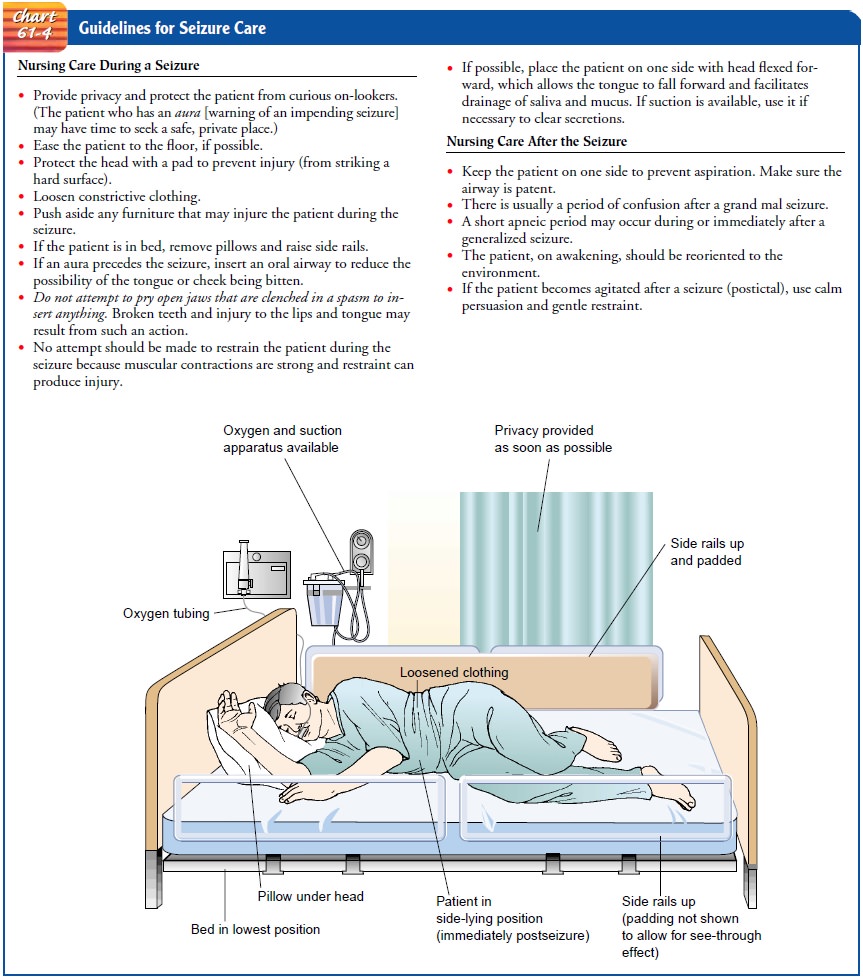Chapter: Medical Surgical Nursing: Management of Patients With Neurologic Dysfunction
Status Epilepticus
STATUS EPILEPTICUS
Status epilepticus (acute prolonged seizure
activity) is a series of generalized seizures that occur without full recovery
of con-sciousness between attacks (Greenberg, 2001). The term has been
broadened to include continuous clinical or electrical seizures lasting at
least 30 minutes, even without impairment of con-sciousness. It is considered a
medical emergency. Status epilepti-cus produces cumulative effects. Vigorous
muscular contractions impose a heavy metabolic demand and can interfere with
respi-rations. There is some respiratory arrest at the height of each seizure
that produces venous congestion and hypoxia of the brain. Repeated episodes of
cerebral anoxia and edema may lead to ir-reversible and fatal brain damage.
Factors that precipitate status epilepticus include withdrawal of antiseizure
medication, fever, and concurrent infection.
Medical Management
The goals of treatment are to stop the seizures as
quickly as possible, to ensure adequate cerebral oxygenation, and to maintain
the patient in a seizure-free state. An airway and adequate oxygenation are
established. If the patient remains unconscious and unresponsive, a cuffed
endotracheal tube is inserted. Intravenous diazepam (Valium), lorazepam
(Ativan), or fosphenytoin (Cere byx) is given slowly in an attempt to halt
seizures immediately. Other medications (phenytoin, phenobarbital) are given
later to maintain a seizure-free state.
An intravenous line is established, and blood
samples are ob-tained to monitor serum electrolytes, glucose, and phenytoin
lev-els (Greenberg, 2001). EEG monitoring may be useful in determining the
nature of the seizure activity. Vital signs and neu-rologic signs are monitored
on a continuing basis. An intravenous infusion of dextrose is given if the
seizure is due to hypoglycemia. If initial treatment is unsuccessful, general
anesthesia with a short-acting barbiturate may be used. The serum concentration
of the antiseizure medication is measured because a low level sug-gests that
the patient was not taking the medication or that the dosage was too low.
Cardiac involvement or respiratory depres-sion may be life-threatening. There
is also the potential for pos-tictal cerebral edema.
Nursing Management
The nurse initiates ongoing assessment and
monitoring of res-piratory and cardiac function because of the risk for delayed
depression of respiration and blood pressure secondary to ad-ministration of
antiseizure medications and sedatives to halt the seizures. Nursing assessment
also includes monitoring and docu-menting the seizure activity and the
patient’s responsiveness.
The patient is turned to a side-lying position if
possible to assist in draining pharyngeal secretions. Suction equipment must be
available because of the risk for aspiration. The intravenous line is closely
monitored because it may become dislodged during seizures.
A
person who has received long-term antiseizure therapy has a significant risk
for fractures resulting from bone disease (osteo-porosis, osteomalacia, and
hyperparathyroidism), a side effect of therapy. Thus, during seizures, the
patient should be protected from injury using seizure precautions and monitored
closely. No effort should be made to restrain movements. The patient having
seizures can inadvertently injure nearby people, so nurses should protect
themselves. Other nursing interventions for the person having seizures are
presented in Chart 61-4.

Related Topics